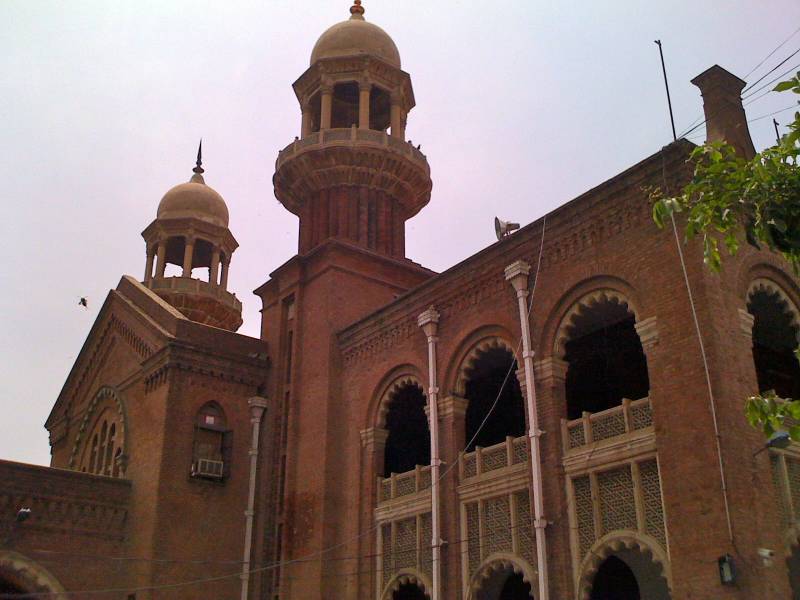LAHORE - The Lahore High Court yesterday restrained the government from constructing Metro Train project within 200 feet on both sides of the immovable antiquities (national heritages) and special premises which fall on the 27.2km route.
A Division Bench of the LHC also set aside all No Objection Certificates (NoCs), previously issued by the government authorities to permit construction of the track of this Chinese model train, presuming it would pass at least 200ft away from the 11 valuable premises that fall on the way. The court directed for a fresh and independent study on this issue.
The Rs165billion mega project, being built with technical know-how of Chinese contractor company CR-Norinco under Mass Transport Authority of the Punjab government, has reached 35 to 40 percent completion since its start in September last year and is scheduled to be commissioned by December 2017.
On 10 constitutional petitions challenging the Lahore Orange-Line Metro Train from different angels, the bench of Justice Abid Aziz Sheikh and Justice Shahid Karim however did not order scrapping the project.
The court dismissed claims that the project may cause environmental hazards, partly because the petitioners did not invoke jurisdiction of the environmental tribunal as first forum of remedy. It however directed the government to ensure strict implementation of recommendations made by the Advisory Committee on Environment in its report on May 7 last.
A government counsel, on the condition on not being named, said an appeal will be filed before the Supreme Court against LHC’s restraining order.
The court directed the Director General Archaeology to engage independent consultants and experts of international stature, preferably taking the Unesco in the loop, to carry out a fresh ‘independent study/report’ regarding the protected immovable premises which have also been included in the list of international historical monuments.
The government will then seek fresh permission from the competent authority in light of that study, it further directed. The DG Archaeology, it observed, does not have ‘unbridled’ powers to allow any construction within 200-foot radius of any heritage.
“Such permission cannot be granted as ministerial job in routine at the whim and wish of director general but such permission is only in exceptional circumstances subject to necessary inspections, expert opinions and unequivocal conclusion by the authority,” it added.
The court held in the decision that the department would not grant permission for any construction if development plan, scheme or new construction is likely to damage the protected antiquity in any way.
To structure the discretion of a competent authority for future permission in such cases, the court directed the government to frame rules in terms of Section 37 of the Act of 1975 and Section 16 of the Ordinance of 1985 which are relevant to the subject.
The heritage sites which are hit by Orange-line construction are Shalimar Gardens, Ghulabi Bagh Gateway, Buddhu ka Awa, Chauburji, Zaib-un-nisa Tomb, Lakhshmi Building, General Post Office, Aiwan-i-Auqaf, Supreme Court’s Lahore registry building, St. Andrews Presbyterian Church at Nabha Road and Baba Mauj Darya Bukhari Shrine.
The court had previously ordered halting the construction work on the said sites after the petitioners argued that almost all the said heritages were within 200ft limits in various degrees.
The bench has also sought assistance of senior lawyers, including SCBA President Syed Ali Zafar and Waqas Mir advocate, as amicus curies.
Ali Zafar in his arguments highlighted the point that development must always be sustainable and the government while undertaking an urban planning project must take care that the protected sites remain unharmed and undamaged.
If a development work did not meet the four corners of law and infringed the fundamental rights, the courts are obliged not to let the same to be carried out on the principle that ‘a vibrant existing urban fabric was connected to the right of life’.
Barrister Ali wanted the government to appoint a panel of international experts to determine the damage and effect of the project on the monuments and then make a final decision.
Advocate General Punjab Shakilul Rehman Khan represented the provincial government and Azhar Siddique argued on behalf the petitioners. Attorney General of Pakistan Ashtar Ausaf represented the federal government in the case.






